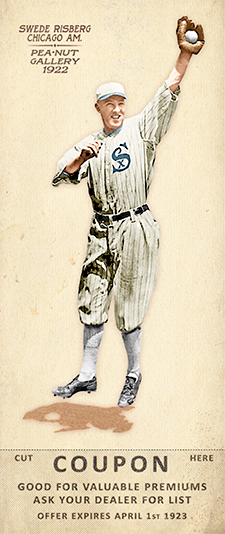
- Series: 1919 Black Sox Scandal
- City: Chicago
- Team: White Sox
- League: American League
Charles August Risberg (1894-1975) grew up on the streets of San Francisco, dropping out of school in the third grade. He had a flair for baseball and, when he switched to shortstop, he blossomed into a defensive star worthy of a call-up to the White Sox in 1917. Swede’s minor league experience foreshadowed the future outlaw character he would display almost from his arrival in the big leagues. In 1913, when Risberg traveled to the LA area to play in the Pacific Coast League, he was drawn to the Vernon/Venice Tigers. At that time these were the only communities in Los Angeles county that were “wet.” Booze was the defining identifier for owner Pete Maier’s club. When it was in Vernon fans could enter the park directly from Doyle’s bar.
Risberg made the big club based on his defense, but hit so poorly in his rookie season that he only got two pinch hitting appearances in the ‘17 Series when the Sox beat the Giants. Swede returned to California for part of the 1918 season, escaping the draft by taking a shipyard job that amounted mostly to playing semi-pro ball for the company during that “work or fight” year. By his own testimony, Swede was crooked throughout his major league tenure, all with Chicago. He claimed to have been the organizer of a scheme in 1917 to bribe Tiger players to throw some games. And he was at the center of the Black Sox Scandal in 1919. Later many would assert that, despite the clear conspiracy with gamblers, the Reds won fair and square although they were thought to be far inferior to Chicago. It is difficult to make a case from the players’ performance. Risberg would be an exception. He apparently threw himself into the fix with zeal, committing a record eight errors and going 2 for 25 at bat. And his reported payout of $15,000, which was more than four times his salary, was a far bigger reward than others realized. He may have earned his bonus because he served as an enforcer. Joe Jackson received a death threat from Risberg if he “blabbed.” Shoeless Joe would later describe Swede as a “hard guy.”
- True to his scofflaw nature, Risberg defied Judge Landis’ ban and played exhibition ball for years. As the youngest of the “Eight Men Out,” and having a very brief tour in the majors, he had incentive to play wherever he could
- It may be that the game he tarnished got its revenge. Swede had been spiked in Chicago and the wound never properly healed. He lost the leg in his old age, dying in a nursing home in Redding, CA on his 81st birthday
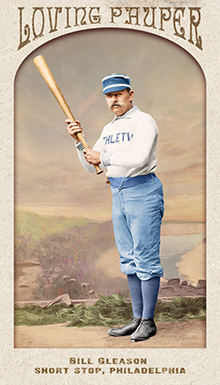
- Series: 1880s: Loving Paupers
- City: Philadelphia
- Team: Athletics (AA)
- League: American Association
William G. Gleason (1858-1932) was an American Association shortstop for three teams from 1882-89. During those eight seasons Gleason hit .267. He debuted with his hometown St. Louis Brown Stockings and participated in their three pennants in '85, '86 and '87. He was an everyday player and increased the number of games played every year with the club, culminating in '87 when he appeared in 135 games with a fine .288 average. St. Louis management must have anticipated a decline was in store. He was traded to Philadelphia's Athletics in '88, where his hitting fell off to .224. Philly dealt him to the Louisville Colonels for his final campaign. Gleason saw action in only 16 games in 1889. He stayed in pro ball for two more minor league seasons with Washington of the Atlantic Association in 1890 and finished up with the Rockford Hustlers of the Illinois-Iowa League the following year where he recorded by far the highest average on a squad that included eight other past or future big leaguers.
- In a storied and rowdy “championship” contest following the 1885 season, Gleason's Browns vied with the formidable White Stockings. Bill was at the center of the storm as his throw to first was ruled late, infuriating the home folks and precipitating a long row in which Cap Anson refused to allow the Chicago umpire to be replaced. Comiskey called his team off the field which led to a forfeit of the first game. The “Series” ended in a tie.
Auction History
Cartophilia
Old Judge Pose: 193-2
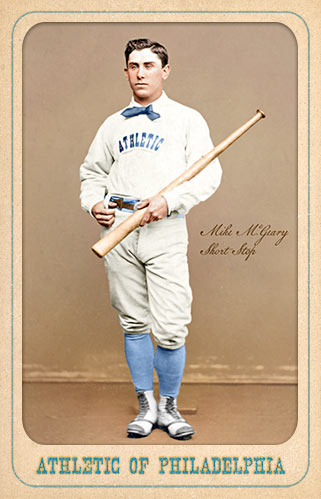
- Series: Athletic of Philadelphia: 1874
- City: Philadelphia
- Team: Athletics (NAPBBP)
- League: National Association (NAPBBP)
Michael Henry McGeary (1851-1933) was, per Sporting Life in 1905, “the best runner in his profession,” due largely because he was “the one player who regularly practiced sliding.” McGeary was also nearly impossible to strikeout. From 1871-76, McGeary fanned only six times in 1,518 plate appearances.
Mike began in pro ball with the Troy Haymakers in ‘70 and stayed with the team as it became a founding member of the National Association the next season. Usually an infielder, Mike was the shortstop for the Philadelphia Athletics when Al Spalding led his Boston club and the A’s on a tour of Britain and Ireland in the summer of 1874. Designed by Harry Wright to promote the game in Europe, the expensive effort failed to generate interest.
McGeary joined the new NL with the St. Louis Browns in 1876 during the era when gambling was rife and William Hulbert was bent on reform. Long-suspected of throwing games, McGeary was the first NL player accused. Suspended and reinstated due to a lack of evidence, Mike continued to generate rumors and suspicion but escaped sanctions and completed over a decade in the game.
- Sporting Life in 1888 described the yellow “parasol” captain McGeary used to signal to the bettors in the grandstands. In one 1875 game, Mike made five of his Philadelphia White Stockings’ 21 errors in a loss to Chicago, reportedly earning each Philadelphia player between $300-$500 from the gamblers.
- From 1871-1875, McGeary averaged 1.22 runs per game, scoring 305 runs in 250 games
- Over his career, McGeary struck out just 60 times in 2,507 plate appearances
- One of the most prominent players of the era, Mike appears on an 1871 Burr Pennfield Troy Haymaker Scorecard. Inspired by and rarer than the Mort Rogers' Scorecards, such "photographic picture cards" were important precursors to the modern baseball card

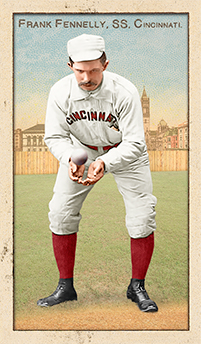
- Series: Beginnings: 1880's
- City: Cincinnati
- Team: Red Stockings (AA)
- League: American Association
Francis John Fennelly (1860-1920) came out of Fall River, MA to whack 34 career home-runs in the American Association. Not a bad sum for the era of flabby, misshapen baseballs. And, thanks to careful research, Frank’s effectiveness swinging a stout wooden implement does, indeed, exceed the prowess of his classmate and more famous hometown slugger, Lizzie Borden. Despite the scurrilous playground rhyme to the contrary, Lizzie used only about 30 blows to become the most famous self-made orphan in New England. Frank’s more prosaic career took him to Washington as a rookie with the Nationals in 1884 where he led the team in batting as their shortstop. He finished his debut year with Cincinnati where he hit .352 and earned his keep until traded to the Athletics during the ‘88 season. A brief stint with the Brooklyn Gladiators in 1890 concluded his major league experience. Overall, Fennelly’s BA was .257 with 175 stolen bases. He led the American Association in RBI (89) in 1885.
- The notorious axe murders occurred in 1892; two years after Frank returned home
- Frank was born six months before Lizzie, who outlived him by seven years
- Frank is buried in St. Patrick’s Cemetery; Lizzie is buried in Oak Grove Cemetery, next to her parents
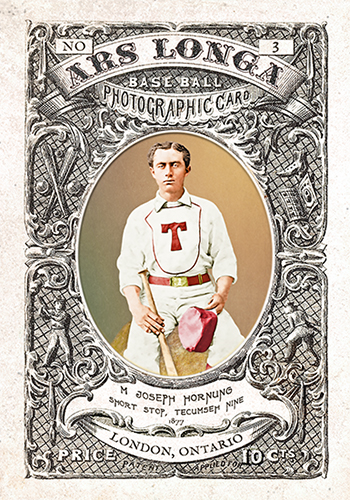
- Series: Mort's Reserve
- City: London
- Team: Tecumsehs
- League: International Association
Michael Joseph Hornung (1857-1931) made a lasting impression in the baseball world of his day on at least two grounds. Most noteworthy, he was perhaps the premier defensive outfielder of the 1880s. His sure-handedness allowed him to lead the National League in fielding percentage in 1881, ‘82, ‘83 and ‘86. The second basis of notoriety for Hornung was what must have been a very annoying habit. He would shout “ubbo, ubbo!” whenever he got a hit or made a play he fancied. Since he hit a respectable .257 over his twelve-year career, and made just about all the plays that came his way in the no-glove era, the ballparks of the day must have resounded with many an “ubbo.” His antics led to his nickname Ubbo Ubbo, which meant others beside himself were uttering the gibberish all too frequently.
Joe had begun his pro career in Canada with the London (Ontario) Tecumsehs in 1876. His major league debut was with the Buffalo Bisons in 1879 and in '81 made the move to Boston which would be his home through the 1888 season. The colorful star's performance declined and the Beaneaters tried to sell him to the White Stockings. The veteran balked, insisting on a piece of the $5000 price, and was rewarded by being ousted from the league. The American Association's Orioles welcomed Joe and he played one year on a bad leg before ending his big league career in 1890 with the Giants. His speed had been an asset afield and on the bases. Hornung was a renowned base-stealer, usually among the leaders in triples, and led the NL in scoring in 1883.
- Ubbo Ubbo's popularity was such that the vaunted '27 Yankees honored him on his June 12 birthday at the stadium. Ruth, Gehrig, Lazzeri and all serenaded Joe and he received a “nice check” from players who remembered him fondly as one of the greats.
- His hometown Utica paper hailed him as “King of the Left Fielders” and “just as much a baseball hero as Ty Cobb, Babe Ruth or Tris Speaker is today.”





